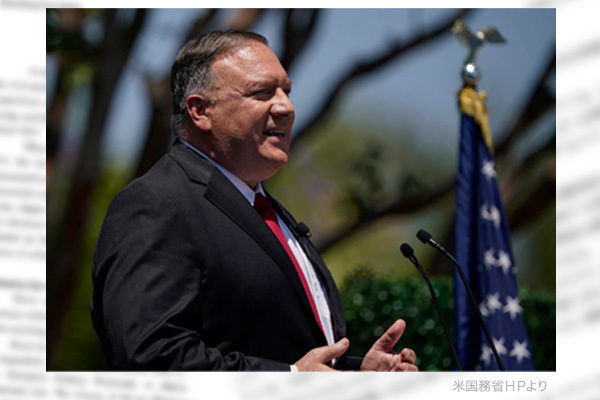U.S. Secretary of State Mike Pompeo’s speech titled “Communist China and the Free World’s Future” at the Richard Nixon Presidential Library in California on July 23 was apparently of epoch-making significance in the Trump administration’s China policy.
The Pompeo speech effectively declared that Washington would shift away from the engagement policy with China because the behavior of the Chinese Communist Party, that gives priority to the interest of the party and its leaders rather than 1.4 billion Chinese people, is incompatible with that of democracies. The Trump administration has provided a series of China policy speeches since June by President Donald Trump’s national security adviser Robert O’Brien, Federal Bureau of Investigation Director Christopher Wray, Attorney General William Barr and Secretary Pompeo. Vice President Mike Pence also delivered tough China policy speeches in 2018 and 2019. In this “Speaking Out” column on July 20, I discussed the United States’ rollback against China in all fields including military sphere. The combination of tough speeches and the rollback indicates how serious the U.S. is in dealing with China.
End of engagement policy
Washington’s China engagement policy got specific meaning in 1991 when then U.S. President George H.W. Bush, after winning the Cold War and the Gulf War, schemed “a new world order” including the democratization of the Soviet Union following its collapse. Based on the new world order scheme, then Secretary of State James Baker explained that communist China should be included into the international economic system and should be democratized. Pompeo declared an end to the China engagement policy and proposed a new alliance of democracies.
The Trump administration has gotten tougher against China as Beijing even amid the novel coronavirus pandemic has launched a rash of aberrant actions, including the intensification of activities in the South and East China Seas, the enforcement of a new national security law in Hong Kong, an armed border clash with India and economic sanctions on Australia.
National security as premise for economic prosperity
Pompeo is concerned that some U.S. allies might get afraid of China. He complained that a North Atlantic Treaty Organization ally has not stood up in the way that it needs to with respect to Hong Kong because it fears with timidity that Beijing would restrict access to China’s market.
Everyone may suspect Germany as the NATO ally in question. German Chancellor Angela Merkel has failed to fulfill its commitment to increase defense spending to 2% of its gross domestic product, has promoted Russia’s Nord Stream 2 gas pipeline project and approached China. Angered by these actions, President Trump has vowed to withdraw part of U.S. forces in Germany.
The pursuit of economic interests is important but cannot stand without national security. The Pompeo speech could become the sting of a reproach to political and business leaders in Japan.
Tadae Takubo is Vice President, Japan Institute for National Fundamentals and a professor emeritus at Kyorin University.


